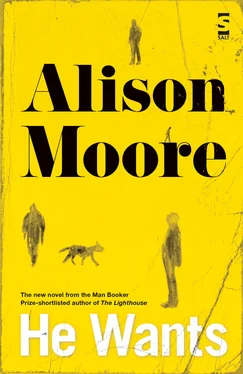The shade was believed to induce calm. When the manager learnt that the shade was instead suspected of, over time, increasing agitation, the pink was painted over with lavender. The manager hopes that the new colour in the corridors — these lavender tunnels — will prove to be soothing to the residents.
There are pictures hanging on the walls — small watercolours of boats in harbours, of woodland in the autumn, of setting suns. There is no modern art, nothing that, like a Rorschach image, might be open to interpretation.
The furniture is rounded or cushioned; there are no sharp corners. Some of the wood is real and when it is polished the whole place smells of Mr Sheen. There is a CD player on an oval table in the corner of the communal living room. The CDs one can choose from are of bird song and dolphin song and the sound of the sea.
Lawrence, who has had his midday soup and white-bread sandwiches, who is full of preservatives, is sitting in one of the two dozen beige, wipe-clean chairs. He is waiting for someone to come. He is not sure who, or perhaps what — maybe this is the day the dog comes. He knows, though, that someone or something is coming.
It is not Sunday, when Lewis comes and takes him to the nearby church. Lawrence was baptised long ago but Lewis is still deciding whether or not he is ready. He is afraid, thinks Lawrence, of what will happen. He is not afraid of the baptism itself, of being submerged, although he never was confident in the water. It is the promise of entering into a bright new world that makes him anxious. Lawrence imagines his son worrying about finding himself there without something he needs — his gloves, perhaps. Lewis is afraid of the Eucharist, the taking of the body and the drinking of the blood of Christ. It is not just that he does not like the wine. ‘I’m sure,’ Lawrence has said, ‘you could have juice instead.’ But Lewis seems to be afraid of giving himself completely, of surrendering his heart. Since childhood, he has been afraid of the idea that God can see deep down inside him. He sometimes avoided Sunday school, feigning illness, claiming to have stomach cramps that Lawrence did not believe in for a moment.
Lawrence has a good singing voice. At home, in the house on Small Street, he liked to sing in the bath, belting out hymns through the steam. Here, the baths they run for the residents are not so deep, and they don’t let the water get hot enough to steam up the room, and besides, they leave the bathroom door wide open. He only sings in church now. Lawrence would very much like to hear the organist striking up the first few notes of ‘He Is Mine’ but it has never happened. He has made a note to have it sung at his funeral. He would like to see a performance of Handel’s Messiah . He has asked Lewis to buy him the CD but it has not yet appeared; Lewis seems to be having some problem getting hold of it.
Every Sunday, after church, on the way back to the nursing home, Lewis stops at the newsagent’s, the sweetshop. He stands there looking at the jars on the shelves — huge plastic jars full of all sorts of brightly coloured sweets — choosing what he wants. When Lewis was small, Lawrence used to say to him, ‘You’re all want.’ Lewis was always calling for his mother. ‘I want you to come,’ he would shout, when he was three, four years old, sitting on his bottom in the middle of the room, ‘I want you to come here now.’ But then, when she went to him, he would not be able to say what he wanted her for. Lawrence does not see why Lewis has to stand for so long looking, trying to decide, when in the end he always buys the same thing, the same sweets every week.
‘Oh,’ says Lawrence.
It is not his birthday, he is sure of that. On the wall just inside the kitchen, there is a list of names and dates, days on which there will be birthday cake. Through this one and that one a pencil line has been drawn, indicating the passing not of the birthday but of the birthday girl or boy. Lawrence, who has seen this list, wonders about the use of pencil, which seems rather tentative, non-committal. Hanging from a string, there is a pencil with a rubber on the end, in case of mistakes, he supposes; in case, he likes to say to the nurses, God does not want them and sends them back. His name is still on the list, a little way down, towards the end of the year; he has not yet been crossed out. He likes to go into the kitchen; he likes to see how clean they keep it. There are steel work surfaces. There is a vast fridge with shiny steel doors. Another appliance is full of steam that billows out when a steel door is pulled down. Lawrence is not allowed to go into the kitchen. When they find him in there, they take his arm. ‘Inspection time, is it, Lawrence?’ they say, looking at one another. ‘Pass or fail?’ And then they take him back to wherever he was.
He sees someone in the corridor — a lady, perhaps a nurse going by. Lawrence calls out but she does not hear him, or does not come anyway. ‘I know you’re there,’ he says. He listens, hearing voices, hearing a fly that has got itself stuck to some fly-paper. ‘Where are you?’
Doris Bolton is sitting a few seats along from him, her small hands gripping the arms of her chair as if the nurses might want to take it away from her, just as they have taken, so she claims, her mother’s silver hairbrush and her gramophone. Her son comes every day, just before teatime. He is very sweet to his mother, although Lawrence is aware of the boy’s reputation and has noticed that some of the nurses are nervous around him. When Doris’s boy leaves, he always takes the trouble to say goodbye to his mother’s friends, as he calls them. He shakes Lawrence’s hand; he knows him by name.
‘Oh,’ says Lawrence.
Doris is watching a home improvement programme on the television. The workers are in the garden, putting down black polythene to stop the grass and weeds growing through. They are spreading a ton of pebbles on top of the polythene, erecting bamboo fencing and installing a water feature, electrically driven running water. They are laying nonslip decking, putting up waterproof fairy lights and arranging outdoor furniture and pot plants so that the people will have somewhere nice to sit at the end of the day.
On these makeover programmes, they always go back a year later. Lawrence sometimes wonders if they wish they just hadn’t looked, if they wish they had just done the job — laid the pebbles and the decking, cleaned the limescale off the sink and cleared out the fridge, thrown away the middle-aged lady’s sequined tops and replaced them with the trouser suits that flatter her figure and her autumnal colouring — and then walked away, knowing that their work was done, that they had done some good. But they go back. They wait a year and then return, with the camera already filming as they stand on the front doorstep and knock. They can’t help it, they have to look. They have to see the state of the garden now, the state of the kitchen; they have to see what the lady is wearing. They will find that the weeds are growing through despite the polythene. They will see the cat excrement in amongst the pebbles, the sticks of bamboo that have split and snapped, the half-dead plants flattened by footballs, the decking turning green. They will see the limescale on the sink, the double cream in the fridge. They will discover that the lady has been into the bin bags, digging out a sequined top and wearing it to the karaoke on Thursday nights; they will find the autumnal trouser suits still hanging in the wardrobe, barely worn. They will be disappointed.
The house on Small Street had a back garden. No wider than the narrow house and only ten feet deep, it backed up against a field whose edges you could not even see and you could almost think of that as an extension of the garden, except that there was a wall between the two, and the field was private with no public right of way. Signs on the gate said, ‘KEEP OUT’ and, ‘DOGS WILL BE SHOT’. You could see the field though, from the upstairs windows. A sizeable tree grew in the nearest corner. Its branches hung over the wall, dappling the bed in which Lewis planted apple pips that never grew into trees, and in which he tried to grow sunflowers faster than the slugs could eat them. The garden did not get much sunshine, but they put the stripy deckchairs out there anyway, next to the sunflower stumps.
Читать дальше












